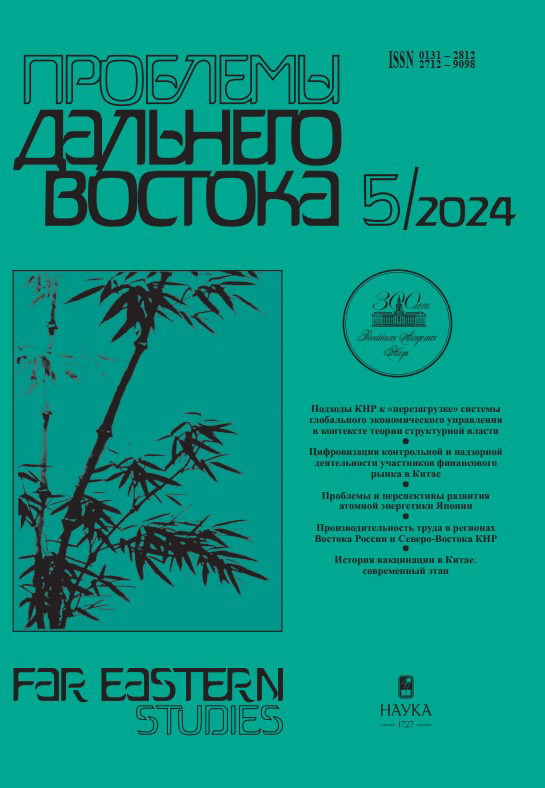Problems and Prospects of Development of Nuclear Energy in Japan
- 作者: Emelyanova O.N1, Shcherbakov D.A2
-
隶属关系:
- Lomonosov Moscow State University
- HSE University
- 期: 编号 5 (2024)
- 页面: 53-69
- 栏目: Economics
- URL: https://ruspoj.com/0131-2812/article/view/676250
- DOI: https://doi.org/10.31857/S0131281224050041
- ID: 676250
如何引用文章
详细
The Fukushima disaster in 2011 temporarily changed Japan's priorities and increased criticism of nuclear power. However, since its long-term abandonment has caused serious losses in the country's energy security, and it is clear that despite the Japanese public's fear of nuclear disasters, the Japanese government is slowly and carefully putting nuclear power back on Japan's energy development agenda. This became especially noticeable in the actions of the Cabinet of Fumio Kishida, as well as the current Japanese government, which continued the course towards "revival" of nuclear energy. Even according to the most pessimistic scenario of the World Nuclear Association, by 2040 it is planned to increase the global capacity of nuclear power plants to 486 GW, which is 24 % more than in 2023. According to the basic and optimistic scenarios, growth is expected to be 75 % and 138 %, respectively. Such prospects suggest that the era of nuclear energy is far from over. 10 EU countries, including Bulgaria, Hungary, Poland, Romania, Slovenia, Slovakia, Finland, France, Croatia and the Czech Republic, have proposed officially including nuclear energy in the list of areas for green investments, which, in their opinion, will allow to abandon imported energy supplies. In February 2024, the Council of EU Member States and the European Parliament, after lengthy negotiations in Brussels on the Zero Emissions Industry Act (NZIA), agreed to declare nuclear energy a strategic technology for the decarbonization of the EU. How is Japan planning to integrate into this trend? What is the reason for the expected shift in the country's energy balance in favor of nuclear energy? How does this correspond to the tasks of ensuring its energy security? How has the role of nuclear power changed in the context of Japan's energy transition? In this article, the authors have attempted to answer these questions.
作者简介
O. Emelyanova
Lomonosov Moscow State University
编辑信件的主要联系方式.
Email: emelianovalesia@hotmail.com
ORCID iD: 0000-0002-6137-9734
Ph.D. (Economics), Junior Researcher
MoscowD. Shcherbakov
HSE University
Email: dshcherbakov@hse.ru
ORCID iD: 0000-0001-8607-6265
Ph.D. (Economics) Associate Professor, Faculty of World Economy and International Affairs
Moscow参考
- Glazyev S. Ryvok v budushee [Leap into the Future]. Knijniy mir. 2019.768 s. (In Russ.)
- Korneev K.A. Japan’s Energy Policy: Current Challenges and Problems. Problemy Dal’nego Vostoka. 2023. No. 4. Pp. 73–84. doi: 10.31857/S013128120026885–4. (In Russ.)
- Dauvergne P. Nuclear Power Development in Japan: "Outside Forces" and the Politics of Reciprocal Consent // Asia Survey. Volume 33. Iss. 6. June 1, 1993. URL: https://online.ucpress.edu/as/article-abstract/33/6/576/3539/Nuclear-Power-Development-in-Japan-Outside-Forces?redirectedFrom=fulltext (дата обращения: 15.09.2024).
- Espen M. Energy, Industry and Politics: Energy, Vested Interests, and Long-term Economic Growth and Development // Energy 35. No. 4. April 1, 2010. Pp. 1730-1740. doi: 10.1016/j.energy.2009.12.026
- Espen M. Vested Interests, Energy Efficiency and Renewables in Japan // Energy Policy. October 1, 2011. doi: 10.1016/j.enpol.2011.09.070 Japan 2021. Energy Policy Review // IEA. 2021. URL: https://iea.blob.core.windows.net/assets/3470b395-cfdd-44a9-9184-0537cf069c3d/Japan2021_EnergyPolicyReview.pdf (дата обращения: 13.09.2024).
- Lempriere M. Scrapping Monju: The Curtain Falls on Japan’s Experimental Fast Breeder Reactor. Power Technology. January 3, 2017. URL: https://www.power-technology.com/features/featurescrapping-monju-the-curtain-falls-on-japans-experimental-fast-breeder-reactor-5708445/ (дата обращения: 15.09.2024).
- The Nuclear Fuel Report. Global Scenarios for Demand and Supply Availability 2023-2040 // World Nuclear Association. URL: https://world-nuclear.org/our-association/publications/global-trends-reports/nuclear-fuel-report (дата обращения: 11.09.2024).
- Yamashita Kiyonobu. History of Nuclear Technology Development in Japan // AIP Conference Proceedings. January 1, 2015. doi: 10.1063/1.4916842
- 「日本原燃」再処理工場など 完成目標を延期 県に報告 [JNFL Postpones Completion Targets for Reprocessing Plant]. NHK NEWS. 23.08.2024. URL: https://www3.nhk.or.jp/lnews/aomori/20240823/6080023425.html (accessed: 15.09.2024). (In Japan.)
- 年度の温室効果ガス排出量について [Greenhouse Gas Emissions, 2013]. National Institute for Environmental Studies. URL: https://www.nies.go.jp/whatsnew/2014/20141204/20141204.html (accessed: 01.10.2024) (In Japan.)
- GX 実現に向けた基本方針 ~今後 10 年を見据えたロードマップ~ [Basic Policy for the Realisation of GX. Roadmap for the Next 10 Years]. 経済産業省. 02.2023. 第3ページ. URL: https://www.meti.go.jp/press/2022/02/20230210002/20230210002_1.pdf (accessed: 13.09.2024). (In Japan.)
- GX 実現に向けた基本方針 ~今後 10 年を見据えたロードマップ~ [Basic Policy for the Realisation of GX. Roadmap for the Next 10 Years]. 内閣官房. 02.2023. 第7ページ. URL: https://www.cas.go.jp/jp/seisaku/gx_jikkou_kaigi/pdf/kihon.pdf (accessed: 15.09.2024). (In Japan.)
- エネルギー基本計画 [Basic Energy Plan]. 経済産業省 資源エネルギー. 2010. 第27ページ. URL: https://www.enecho.meti.go.jp/category/others/basic_plan/pdf/100618honbun.pdf (accessed: 12.09.2024). (In Japan.)
- エネルギー基本計画 [Basic Energy Plan]. 経済産業省 資源エネルギー庁. 2014. URL: https://www.enecho.meti.go.jp/category/others/basic_plan/pdf/140411.pdf (accessed: 12.09.2024). (In Japan.)
- 原子力利用に関する基本的考え方 [Basic Policy on the Use of Atomic Energy]. 原子力委員会. 2023. (In Japan.)
- 原子力基本法 (昭和三十年十二月十九日法律第百八十六号) [Atomic Energy Basic Law (Law No. 186 of December 19, 1945)]. (In Japan.)
- 原子力白書 [White Book of Nuclear Energy, 1993]. 原子力委員会. 11.1993. URL: https://www.aec.go.jp/jicst/NC/about/hakusho/wp1993/index.htm (accessed: 10.09.2024). (In Japan.)
- 原子力白書 [White Book of Nuclear Energy, 2022]. 原子力委員会. 第115ページ. (In Japan.)
- 原子力規制委員会 六ヶ所再処理工場など現地調査 [Nuclear Regulation Authority|Field Survey of Rokkasho Reprocessing Plant and Other Sites]. 0テレNEWS. 29.06.2024.URL: https://news.ntv.co.jp/category/society/3c69134836074adeba426d17a4efcbf2 (accessed: 15.09.2024). (In Japan.)
- 原発建て替え、敷地内で GX基本方針を閣議決定 [Cabinet Decision on Reconstruction of Nuclear Plant and On-Site GX Basic Policy]. 日本経済新聞. 10.02.2023. URL: https://www.nikkei.com/article/DGXZQOUA091ZF0Z00C23A2000000/ (accessed: 15.09.2024). (In Japan.)
- 日本における原子力の平和利用のこれまでとこれから [The Past and Future of the Peaceful Use of Nuclear Energy in Japan]. 経済産業省 資源エネルギー庁. 22.02.2018. URL: https://www.enecho.meti.go.jp/about/special/tokushu/nuclear/nihonnonuclear.html (accessed: 11.09.2024). (In Japan.)
- 日本のエネルギー政策 ~2030年, 2050年に向けた方針~ | 日本のエネルギー事情と原子力政策 [Japan's Energy Policy — Policies Towards 2030 and 2050 — | Japan's Energy Situation and Nuclear Power Policy]. Japan Atomic Energy Relations Organization. 2023. https://www.jaero.or.jp/sogo/detail/cat-01–04.html?id=cont_01 (accessed: 13.09.2024). (In Japan.)
- 日本のエネルギー選択の歴史と原子力 | 日本のエネルギー事情と原子力政策 [History of Japan's Energy Choices and Nuclear Power | Japan's Energy Situation and Nuclear Power Policy]. Japan Atomic Energy Relations Organization. 2023. URL: https://www.jaero.or.jp/sogo/detail/cat-01–01.html. (accessed: 12.09.2024). (In Japan.)
- 日本の原子力発電所の現状 (2010年) [Current Status of Nuclear Power Plants in Japan (2010)]. ATOMICA. 2011. URL: https://atomica.jaea.go.jp/data/detail/dat_detail_02–05–01–10.html. (accessed: 12.09.2024). (In Japan.)
- 枝廣淳子:「東日本大震災後の日本のエネルギーをめぐる状況」 [Edahiro Junko. Japan's Energy Situation after the Great East Japan Earthquake]. JFS. 01.03.2013. URL: https://www.japanfs.org/sp/ja/news/archives/news_id032630.html (accessed: 11.09.2024). (In Japan.)
- 環境への適合 | 日本のエネルギー事情と原子力政策 [Environmental Compatibility | Japan's Energy Situation and Nuclear Power Policy]. Japan Atomic Energy Relations Organization. 2023. URL: https://www.jaero.or.jp/sogo/detail/cat-01–07.html?id=cont_02. (accessed: 13.09.2024). (In Japan.)
- 第6 次エネルギー基本計画 [The Sixth Basic Energy Plan]. 経済産業省 資源エネルギー庁. URL: https://www.enecho.meti.go.jp/category/others/basic_plan/ (accessed: 11.09.2024). (In Japan.)
补充文件









